- Home
- Kent Haruf
Plainsong Page 6
Plainsong Read online
Page 6
Raymond jumped the next one, the old speckle-faced cow, into the chute and caught her head and tightened the sidebars, and Harold stepped forward and lifted her tail and cleaned out the green flop and went in with his hand and arm, feeling. But there was nothing to feel; she was empty. He wiggled his fingers, feeling for what was supposed to be there, but there wasn’t anything.
She’s open, he hollered. She must not of stuck. What you want to do with her?
She always had good calves before, Raymond said.
Yeah, but she’s getting old. Look at her. Look at how gaunt she’s taken in the flank there.
She might stick the next time.
I don’t want to put any more feed in her, waiting to see if she’s going to, Harold said. Pay for that all winter. Do you?
Leave her go then, Raymond said. But she was a good mother, you have to say that for her.
He swung the gate open ahead of her and released the chute, and the old cow trotted out into the empty loading pen from which she would be trucked away, and she raised her speckled face, sniffed the air and turned completely around and stood still. She looked nervous and displaced, jittery-looking. The black heifer in the holding pen on the other side of the fence bawled at her, and the old cow trotted over to the rails where they stood, separated by the fence, breathing at one another.
From the smudge pot the two boys watched it all. They stamped their feet and flapped their arms in their winter coats, warming themselves and watching their father and the old McPheron brothers in their efforts. Overhead the sky was as blue as just-washed café crockery and the sun was shining brilliantly. But the afternoon was turning even colder. There was something building up in the west. From far off over the mountains the clouds were stacking up. The boys stayed near the smudge pot, trying to keep warm.
Later, when there were only a few of the cows and heifers left to test, their father came over to the fence near the smudge pot. He blew his nose thoroughly on a blue handkerchief and folded it and put it back in his pocket. You boys want to come in here and help me? he said.
Yes.
I could use you.
They climbed the fence and dropped down into the corral. The remaining cattle shied back, eyeing them, nervous and jittery, their heads lifted alertly like antelope or deer. The air inside the pen was thick and made the boys want to cover their noses and mouths with something.
Now. Watch me, their father said. They’re excited already. So don’t do anything unnecessary.
The boys looked at the cattle.
Stay even with me. Spread out a little. But watch they don’t kick you. That’s the way they’re going to hurt you. That tall red cow there particularly.
Which one is she? Ike said.
That old tall one, Guthrie said. Without any white on her front legs. See her? With that chewed-off tail.
What’s wrong with her?
She’s gotten spooky. You want to watch her is all.
The boys stayed even with their father. They moved fanwise across the corral. The cattle began to shift and bunch, piling back on one another; they wheeled and massed against the back fence. Behind them a board cracked. Then the cattle began to string out, sliding along the rails, and at the last moment their father rushed forward and yelled at them and lashed out with a thin braided whip and popped an old frosteared cow across the nose and she skidded in the dirt and snorted, then wheeled around. Behind her there was a young white-faced heifer that turned with her.
Guthrie and the boys headed these two across the corral. The boys kept spread out beside him, and the animals trotted ahead kicking up spurts of dirt and dust from the trampled ground, and then at the mouth of the alley the young heifer got frightened and turned back.
Head her, Guthrie shouted. Don’t let her get past. Turn her.
Bobby flapped his arms and hollered, Hey! Hey!
The heifer glared at him, her eyes white-rimmed, and then she whirled around and her tail went up and she bucked once and kicked and then rushed on into the alley, crowding past the old cow that was already there in that narrow space. Raymond jammed the pole through behind them.
All right, their father said. You think you can do that?
What do you mean?
Just do that every time. Bring two in at a time. But be careful.
Where will you be? Ike said.
I need to help up front, Guthrie said. Raymond’s getting tired. It’s too much for one man to do. And that second cow there has a horn that needs to be taken off. He looked at the boys. Here, you can have this.
He handed the thin herding whip to Ike who took it and hefted it and swung it limberly back and forth over his shoulder. He snapped the end of it at a clod of manure. The clod jumped.
What do I get to use? Bobby said. I ought to have something too.
Their father looked around. All right, he said. He called at Raymond: Let me have one of those hot shots out there.
The old man brought one of the cattle prods and handed it over the fence. Guthrie took it and demonstrated it to them, how to rotate the handle and release the little button so it would give a charge. See how you do that? he said. He poked it against his boot toe and it sparked. He handed the cattle prod to Bobby, and Bobby examined it and touched it against his shoe. It sizzled and he jerked his foot back, then he glanced up at them and there was a surprised look on his face.
I get to use it too, Ike said.
Trade off with it, Guthrie said. You can swap the whip with him. But don’t get carried away. It’s just if you need it. And anyway you have to be close enough to even be able to use it.
Does it hurt them? Bobby said.
They don’t like it, Guthrie said. It gets their attention for sure. He put his hands on their shoulders. So. All set?
I guess so.
I’ll be right out here.
He climbed out of the corral and joined the McPheron brothers at the chute. They brought the heifer in and Harold tested her. She was carrying a calf and Raymond shot her twice in the hip and let her out into the holding pen with the others. Then they brought the cow in, and after she was tested and vaccinated Guthrie wrapped his arms around her head and pulled her head violently to one side, her neck stretching tight, her eyes wild and frantic, while Raymond fit the sharp ends of the dehorner over the malformed horn. It was a hard ugly thing, twisting out from where it had been cut off unsuccessfully once before. He clamped down with the dehorner, twisting it, applying pressure on the grips, and finally cut through. The horn dropped off like a piece of sawed wood and left a white dishedout tender-looking place at her skull. Immediately the blood spurted out in a thin spray, making a little puddle in the dirt. Guthrie held on to the cow’s head and she bawled, rolling her eyes in panic, fighting him, while Raymond shook out powdered blood-stop into the cut, and the blood soaked it up and trickled down her face. He shook out more powder and pressed it in, mixing it with his finger, and they released her into the holding pen and she went out tossing her head, with a line of blood still dribbling along her eye.
In the corral the two boys worked hard with the remaining cattle amidst the dirt and swirling dust and they managed to line two more into the alley, and the men began to work on them. But one of the cows turned up open. They released her into the separate loading pen with the old speckle-faced cow, and the two animals nosed one another and stood facing the direction they’d come from.
That’s another one never stuck, Harold said.
Maybe you ought to let old Doc Wycoff breed them, Guthrie said. With his A-I.
Sure. We could do that, Raymond said. Only he’s kind of steep.
That makes me think, Harold said. Didn’t we ever tell you about that time Raymond and me walked in on him?
If you did, Guthrie said, I don’t recall it.
Well, yeah, Harold said. One time me and Raymond went in to see him about something. A cow sick or something. In his clinic there. When we got inside the front door we heard something that sounded kind of like scuf
fling or thrashing coming from in back of the front counter there. We couldn’t tell what it was. So we looked over the top of the counter and old Doc had this gal on her back on the floor behind the counter, and she had her arms and legs wrapped around him about like he was a fifty-dollar bill. She looked up and seen us staring at them. She wasn’t scared by that, she wasn’t even took by surprise. She just stopped moving and released her clench on him. Then she tapped him on the head, still looking up at us over his shoulder, and stopped moving and working, and pretty soon Doc did too. What’s a matter? he says. We got company, she says. Do we? Doc says. We do for a fact, she says. So he moves his head so he can look up at us. Boys, he says. Is it any emergency? It can wait, we tell him. All right then, he says. I’ll be with you in a minute.
Guthrie laughed. That sounds like him, he said.
Don’t it? Harold said.
It didn’t take him long, Raymond said. I imagine he was about finished anyway.
Her too, I reckon, Harold said.
What was she doing, Guthrie said, paying a bill?
No, Harold said. I don’t guess so. It was more like they both got excited by the same idea all of a sudden and couldn’t help themselves.
That happens, Guthrie said.
Yeah, Harold said. I guess.
I guess it does, Raymond said. He looked out across the flat open treeless country toward the horizon where there were blue mounds of sandhill.
. . .
At last there was only the red-legged cow left to test, the one their father had warned them about. She was worse now. She regarded the two boys steadily with her head lifted as if she were some wild range animal that had never seen a human on foot before. The boys had stayed back from her in the corral. They were afraid of her and didn’t want to be kicked. But now they walked toward her, and she eyed them steadily and began to shift and trot along the fence. They cut her off. She was tall and all four of her legs were red; her eyes were white-rimmed. She dropped her head and whirled around, her stubby tail up, stiffened, and galloped across to the other side. They followed her again and came up behind her once more, where she was trapped in a corner. She faced them, her eyes baleful-looking and her sides heaving, and Ike moved closer and swung the whip and snapped it across her face. This surprised her. She jumped sideways, then she leaped forward. She galloped into Bobby, knocking him back off his feet before he could jump out of the way. He landed on his back and bounced once like a piece of thrown stove wood. She kicked back at him and then leaped and bucked across to the far side of the corral. Bobby lay spilled out on the ground. His stocking cap was at his feet, the electric cattle prod flung out to the side. He lay on the trampled dirt looking up at the empty sky, trying to breathe. But his breath wouldn’t come and he began to gouge his feet in the loose ground, while Ike bent over him in panic, talking to him. Bobby’s eyes looked big and scared. Then all at once his breath came back in a rush and he choked and gave a kind of high sob.
His father had seen what happened and had leaped into the corral and come running, and he was bent over now beside him, kneeling at his head. Bobby. You okay? Son?
The boy’s eyes looked all around. He looked scared and surprised. He peered up at the faces over him. I think so, he said.
Did you break anything, do you think? Guthrie said.
He felt of himself. He tried his arms and legs. No, he said. I don’t guess so.
Can you sit up?
The boy sat up and hunched his shoulders. He moved his head back and forth.
You took a bad one, Guthrie said. But you seem to be all right. I guess you are. Are you? He helped the boy stand up and he brushed the corral dirt off his shoulders and where it was stuck to the back of his head. Here, he said. You need to blow your nose, son. Bobby took the handkerchief and used it and wiped his nose and looked at the handkerchief for blood, but it was only dirt and cow dust, and gave it back. His brother pushed the stocking cap back onto his head.
You boys have been doing a good job, Guthrie said. I’m proud of you.
They looked up at his face, then out across the corral.
You did just fine. You did the best you could, he said.
But what about her? Ike said.
Let me have that whip back, Guthrie said. You can help if you want to. But stay clear of her.
They moved once more toward the red-legged cow. She waited at the far side of the corral standing sideways, watching them. She looked as wild as some alley cat, like she might try to scramble over the six-foot-high corral fence and get free that way. She began to step and shift, sliding away. Guthrie walked steadily toward her, the boys following. Then as she was turning he ran up quick behind her and struck her hard with the whip, and she kicked back at him viciously and missed his face and he followed, running, and slashed her again and then just as she was about to head into the alley she wheeled sharply and ran at the fence, gathered herself and jumped at it. She got only halfway across. She crashed through the top pole and was stuck there. Now she was scissored over the fence and she began to bawl, crazy with terror. She thrashed and kicked.
Goddamn it. Quit it, Harold yelled at her. He and Raymond had come running over. Here now. Stop that. You goddamn crazy old raw-boned bitch.
They gathered around, wanting to stop her, to quiet her, but she was kicking and thrashing in a crazy frenzy, and they couldn’t get close. Finally Guthrie climbed over to face her, to shove her back, to see if she’d come that way, but she had thrashed and kicked so much, rocking, teetering on the corral board, that she managed to tip herself forward, and suddenly she went over headfirst into the holding pen, making a heavy crashing somersault, her old angular head down, her hindquarters following, flopping over with a great thump onto the ground. Then she lay still.
I want you to look at that, Harold said. Go ahead then. Stay there. Maybe that’ll knock some goddamn sense into you.
They watched her. Her sides heaved but nothing else was moving. Her eyes stared. Climbing into the holding pen, Guthrie approached and lifted her head with his foot. That seemed to rouse her. She began to tremble and suddenly she rose up, Guthrie stepped back, and then she stood wobbily, glaring around. There was a gash along one flank where it had torn on the splintered corral board. The torn hide quivered and dripped blood in bright quick drops, and all along the back of her and over the top of her head she was covered with a mantle of dirt. She looked like some kind of beast from a medieval pageant, dirty and gory, threatening. She shook her dirty head sideways and took a couple of steps and then limped, trotting, over to the other cattle and heifers. They seemed leery of her and backed away.
Guthrie said, You want me to bring her back around?
No. Let her go, Harold said. We’d have to about kill her to get her in here now. She either stuck when she was with the bull or she didn’t. She seems to think she did, since she wants over there so bad. He looked at her with the other cattle. Anyhow, she seems to of took a serious dislike to you, Tom.
I’ll sort her out again, he said. If that’s what you want.
No. Let her go. We’ll keep an eye on her.
What about that cut?
She’ll heal up. I reckon she’s too disgusted with us to go off and die. She wouldn’t want to give us the satisfaction.
The two boys helped push the tested cattle out into a nearby pasture. The wild red-legged cow limped along in the middle of them. The two open cows were left in the holding pen and they called after the other cattle, their heads lifted, bawling, and moved over to the fence where they stood looking out through the rails. At the chutes the boys helped collect the medicine and the vaccination guns and put them away in the back of the truck. Then they climbed into the Dodge pickup and sat beside their father with the heater pushing out hot air onto their knees while he talked a little more to Harold. Raymond came around to their side of the truck.
Roll your window down, their father said. He wants to say something to you.
The old man stood in the cold in the sa
ndy gravel beside the pickup and took out a soft leather purse from an inner pocket of his canvas jacket and held the purse in his hands and unzipped it. He poked around and picked out two bills. He handed them in through the opened window to the two boys. I hope that’ll be compensation, he said.
They took the money shyly and said thank you to him.
You boys can come back here any time, he said. You’d be welcome.
Wait now, their father said. That isn’t necessary.
You stay out of this, Raymond said. This is between me and these boys here. This don’t concern you, Tom. You boys, you come again any time.
He stepped back. The two boys looked at him. At his old weather-chafed face and reddened eyes under the winter cap. He looked quiet and kindly. They held the money in their closed fists, waiting, not looking at it until their father had finally said goodbye and not until he had put the pickup in motion and they were turned back away from the cattle chutes and had driven past the house and were rattling on the county road with the gravel banging up under the fenders and then were pointed toward the west where the sky was beginning now to fade. Then they looked at the money. They turned it over. He had given them each a ten-dollar bill.
That’s too much, their father said.
Should we give it back?
No, he said. He took his hat off and scratched the back of his head and put the hat back on. I guess not. That would be an insult. They want you to keep it. They enjoyed having you out there.
But Dad, Ike said.
Yes?
Why didn’t they ever get married? And have a family like everybody else?
I don’t know, Guthrie said. People don’t sometimes.

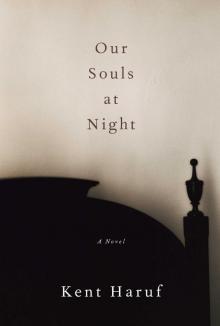 Our Souls at Night
Our Souls at Night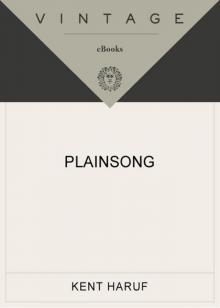 Plainsong
Plainsong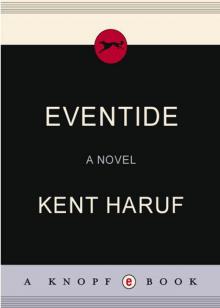 Eventide
Eventide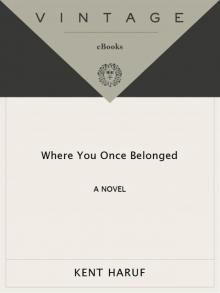 Where You Once Belonged
Where You Once Belonged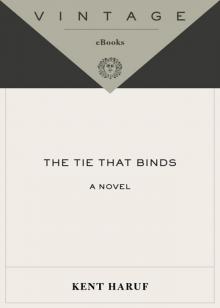 The Tie That Binds
The Tie That Binds Benediction
Benediction